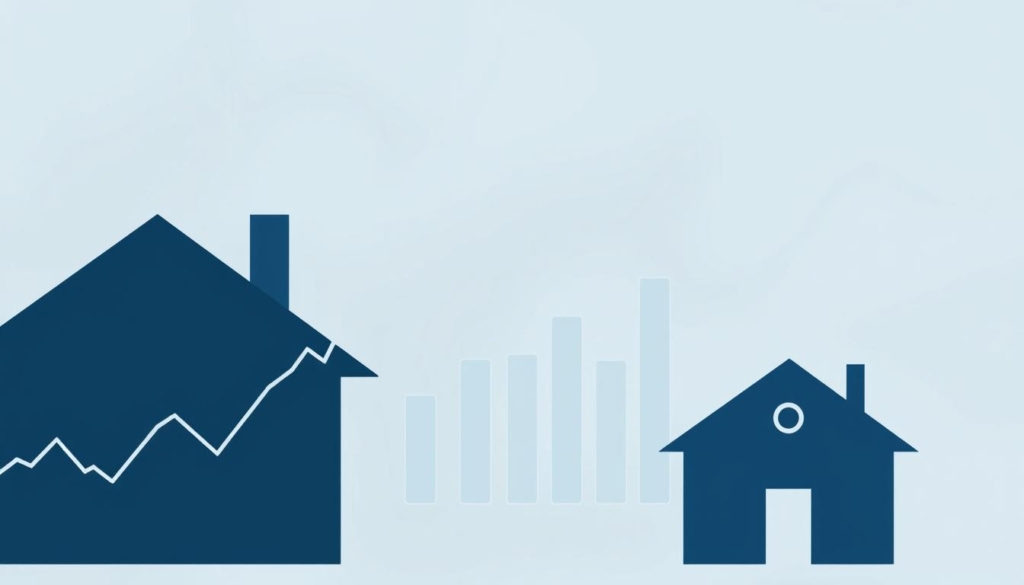Buying a house in Canada needs careful timing and understanding. It’s about knowing when to invest, based on market trends and economic signs. At New Homes Alberta, we know timing is everything.
Experts say the Canadian housing market is looking up. Home sales might jump by 9.2% this year. This means there could be more chances to buy.
When to buy a home depends on many things. Season, economy, and your finances all matter. Each area in Canada has its own housing story.
Key Takeaways
- Canadian housing market shows signs of recovery in 2024
- Seasonal market dynamics significantly impact home purchasing
- Regional variations play a critical role in real estate decisions
- Economic indicators provide valuable insights for buyers
- Financial preparedness is key to successful home acquisition
Understanding the Canadian Housing Market Trends

The Canadian housing market is always changing. It offers both chances and challenges for those looking to invest in property. Recent data shows a complex mix of housing prices and market trends. These are things that buyers and investors need to think about carefully.
Different parts of Canada have their own real estate scenes. Each province has its own market conditions. Knowing these differences is key to making smart property investment choices.
Current Market Conditions
As of January 2025, the Canadian housing market is showing some interesting trends:
- National average home price: $670,064
- Total home sales: 41,118 transactions
- Year-over-year sales activity increase: 3.9%
- National benchmark home price: $709,200
Regional Market Differences
Housing prices differ a lot from one province to another. This is because of local economic conditions and demand:
- British Columbia benchmark price: $955,100
- Ontario benchmark price: $858,600
- Quebec benchmark price: $501,300 (record high)
- Alberta benchmark price: $511,200
“The Canadian housing market is not a monolith, but a mosaic of regional experiences,” says real estate analyst Michael Roberts.
Price Trends Across Provinces
Housing prices are growing at different rates in different areas:
- Quebec: 12.4% year-over-year increase
- Alberta: 5.7% year-over-year increase
- Nova Scotia: 4.8% year-over-year increase
- Saskatchewan: 9.0% year-over-year increase
Experts predict modest growth in 2025. They also think there could be a rebound in housing sales because of expected lower mortgage rates. When investing in property, it’s important to consider these regional differences and market trends.
Interest Rates and Their Impact on Home Buying

Understanding mortgage rates is key for anyone thinking about buying a home in Canada. Interest rates greatly affect how affordable homes are and can change buying plans. The Bank of Canada’s rate changes mortgage rates, making it complex for buyers.
Several things can change mortgage rates:
- Economic conditions
- Individual borrower circumstances
- Federal monetary policy
- Treasury bond yields
Recent trends show interesting chances for home buyers. The projected mortgage rates could reach around 4% by summer. This could make homes more affordable in Canada.
Interest rates and housing markets are closely linked. Lower rates can boost demand and prices. But higher rates can slow things down, giving buyers more power to negotiate.
Canada’s real estate market varies by region. Cities like Toronto and Vancouver have different prices than other areas. Prices can be 8x to 11-12x the average income in big cities.
Understanding interest rate trends is essential for making informed home buying decisions.
Potential buyers should watch:
- Bank of Canada policy rate changes
- Mortgage rate forecasts
- Regional market conditions
- Personal financial readiness
By keeping up with mortgage rates and affordability, buyers can make the most of their purchase.
Seasonal Factors in Home Purchasing
Timing is key when looking to buy a house in Canada. The demand for housing changes a lot throughout the year. This creates chances for smart buyers who know the market well.

Knowing about seasonal changes can help you make smart choices. The Canadian real estate market changes a lot by season. Each season has its own benefits and challenges.
Winter Buying Advantages
January is a great time to buy a house. It has several benefits:
- Less competition from other buyers
- More motivated sellers
- Lower prices
- Properties stay on the market longer
Winter prices are often lower because fewer people are buying. This means you have more time to think and negotiate.
Spring Market Dynamics
Spring is the busiest time in the Canadian housing market. It’s known for:
- More homes for sale
- Prices going up
- More competition from buyers
Summer and Fall Considerations
Summer and fall markets are different:
| Season | Market Characteristics | Buyer Opportunities |
|---|---|---|
| Summer (June-July) | Peak prices | High competition |
| Fall (September-November) | Decreasing prices | More negotiation room |
An experienced real estate agent can guide you through these changes. They help you find the best time to buy a house.
Economic Indicators That Determine a Good Time to Buy a House
Understanding economic factors is key when looking at home affordability in Canada’s real estate market. The complex relationship between different economic indicators can greatly affect your decision to buy a home.
Important economic indicators that shape the housing market include:
- GDP growth rates
- Employment stability
- Inflation trends
- Consumer confidence
Recent market data shows important insights into home affordability. The national median home price has gone up 4% to $407,200. This marks 16 months of price growth, showing how economic factors impact real estate.
| Economic Indicator | Current Status | Impact on Housing |
|---|---|---|
| Inflation Rate | 3% | Moderate pressure on home prices |
| Mortgage Rates | 6.7% | Higher borrowing costs |
| Housing Inventory | 4.2 months’ supply | Limited options for buyers |
Prospective homebuyers should carefully analyze these economic factors to make informed decisions. The current market has its challenges. But understanding these indicators can help you better navigate home affordability.
Experts predict home price growth will slow to 2.3% by August 2025. This could open up opportunities for strategic buyers. The ongoing economic landscape continues to shape the housing market. It’s vital to stay informed and adaptable.
Buyer's Market vs. Seller's Market Dynamics
Knowing the real estate market can change how you buy a home. The Canadian housing demand swings between buyer’s and seller’s markets. Each has its own challenges and chances for homebuyers.
Market dynamics depend on the number of homes and buyers. Market conditions can change fast. It’s key to know the current market before investing big.
Understanding Market Balance
Real estate markets fall into three main types:
- Seller’s Market: High demand, few homes
- Buyer’s Market: Many homes, less competition
- Balanced Market: Equal supply and demand
“In real estate, timing is everything. Knowing the market can save you thousands.” – Canadian Real Estate Association
Negotiation Power in Different Markets
Your negotiating power changes with the market. In a seller’s market, buyers might offer more than the asking price. But, a buyer’s market lets you negotiate better prices.
Signs of the market type include:
- Days homes spend on the market
- How much homes sell for compared to the list price
- The number of homes for sale
- New home construction rates
Watching these signs helps buyers and sellers make smart choices in the Canadian housing market.
Financial Readiness and Mortgage Considerations

Getting ready to buy a home means planning your finances well. You need to check if you’re ready and look at different mortgage options. These choices should fit your budget and future plans.
Here are key steps for getting ready to buy a home:
- Evaluate your credit score (minimum 620 for conventional mortgages)
- Save for a down payment (typically 5-20% of home’s purchase price)
- Build an emergency fund covering 3-6 months of expenses
- Calculate your debt-to-income ratio
Knowing about mortgage rates and how affordable homes are is key. Mortgage rates in Canada change, affecting your monthly payments and total cost.
| Mortgage Type | Down Payment | Interest Rate |
|---|---|---|
| Conventional Loan | 20% | 6.39% |
| FHA Loan | 3.5% | 5.81% |
First-time buyers should follow the 28/36 rule. Your mortgage payments should be no more than 28% of your monthly income. Total debt payments should not go over 36%. This rule helps you avoid financial trouble.
Closing costs, 2% to 5% of the home’s price, are also important. For a $400,000 home, these costs could be $8,000 to $20,000. Buyers need to include these in their budget.
Location Analysis and Property Values
Choosing the right location is key in Canadian real estate. Location analysis helps figure out housing prices and property value growth. Buyers need to look at both urban and suburban markets carefully.

The Canadian real estate scene offers many chances in different areas. Cities like Toronto and Vancouver have higher housing prices than suburbs and rural areas. Picking the right location can greatly affect your investment’s growth.
Urban vs. Suburban Markets
Location analysis shows big differences between urban and suburban real estate:
- Urban markets are close to amenities and have strong job markets
- Suburban areas have bigger homes at lower prices
- How easy it is to get around affects property values
- Neighborhood features can boost property value over time
Future Development Impact
Future developments can change property values a lot. Investors should look into new infrastructure, urban growth plans, and zoning changes. These can impact housing prices in certain spots.
Choosing a location is not just about today’s market. It’s about seeing the future growth.
Thinking about public transit, new businesses, and neighborhood updates can guide buyers. This helps them make better choices in Canadian markets.
Down Payment Requirements and Mortgage Insurance

Understanding down payment requirements is key to buying a home in Canada. The rules for mortgage rates and initial investments change based on several important factors.
Down payment percentages depend on the home’s price:
- Homes $500,000 or less: 5% minimum down payment
- Homes $500,000 – $999,999: 5% on the first $500,000 and 10% on the rest
- Homes $1,000,000 or more: 20% down payment needed
When down payments are less than 20%, mortgage default insurance is required. This insurance protects lenders from risks linked to lower initial investments.
| Down Payment Scenario | Initial Mortgage Amount | Default Insurance Premium |
|---|---|---|
| 5% Down ($25,000 on $500,000) | $475,000 | $19,000 (4%) |
| 10% Down ($50,000 on $500,000) | $450,000 | $13,950 (3.10%) |
| 20% Down ($100,000 on $500,000) | $400,000 | $0 (No insurance) |
First-time homebuyers have special financial tools to help them buy a home. The Home Buyers’ Plan (HBP) lets them withdraw up to $60,000 from RRSPs tax-free for down payments. The First Home Savings Account (FHSA) allows saving up to $40,000 with $8,000 annual contributions.
Knowing about mortgage rates and down payment plans is vital for long-term home affordability. Buyers should look at their finances and government support programs carefully.
Market Predictions for 2024-2025
The Canadian housing market is set for big changes in 2024-2025. Economic factors and mortgage rates will shape the market. Experts see a mix of chances and hurdles for buyers and investors.

- National home prices expected to increase by 4.7%
- Projected national home sales growth of 8.6%
- Average home price stabilizing at $709,200
Expected Rate Changes
Mortgage rates are likely to drop, aiming for the low-to-mid 6% range by late 2025. This could make it easier for people to buy homes. It opens up more chances for real estate investments.
Price Forecast by Region
Canada’s housing market will vary by region. Places like Oakville-Milton and Greater Vancouver will stay pricey. But, cheaper areas offer good investment chances.
| Region | Average Home Price | Monthly Change |
|---|---|---|
| Oakville-Milton, ON | $1,257,800 | +$30,100 |
| Greater Vancouver, BC | $1,173,000 | +$1,500 |
| Mauricie, QC | $287,300 | +$100 |
Real estate experts say to do your homework and get professional advice. This is key when dealing with changing mortgage rates and economic conditions.
First-Time Homebuyer Opportunities
Starting your journey as a first-time homebuyer in Canada is exciting. The Canadian government has created programs to help. These programs aim to make buying a home more affordable.
First-time homebuyers have several opportunities:
- The First-Time Home Buyer Incentive program helps with down payments, giving 5% or 10% assistance.
- There are tax exemptions and credits to lower the costs of buying a home.
- Mortgage insurance programs can also help by reducing financial hurdles.
The First-Time Home Buyer Incentive is a big help with certain rules:
- The program’s gain/loss limit is 8% per year.
- You must repay the incentive after 25 years or when you sell the property.
- Full repayment is required without making partial payments.
Important note: The program’s new submission deadline is March 21, 2024, with no new approvals after March 31, 2024.
In British Columbia, first-time homebuyers get extra benefits. They can get a property transfer tax exemption. This applies to homes valued at $500,000 or less. There are also partial exemptions for homes in certain price ranges.
Planning carefully and knowing about these programs can greatly help first-time buyers afford a home.
Investment Opportunity and Long-Term Value

Investing in property in Canada can lead to long-term wealth. The Canadian housing market has shown strong resilience. It has given impressive returns to smart investors over the years.
Key insights for property investors include:
- Average annual return for residential real estate: 7-10%
- Typical rental yield: 3-5%
- Combined annual return from capital appreciation and rental income: 8-10%
Housing prices in Canada vary widely, making it a diverse investment field. The Canadian Real Estate Association (CREA) tracks 60 areas across 9 provinces and 51 cities. This reveals a lot of investment possibilities.
Market statistics show the investment strength:
- 35 out of 51 tracked areas saw property value increases over 100%
- Average market increase across tracked areas: 109.1%
- Lowest area tracked saw a 5.2% increase
- Highest area experienced a stunning 220.4% increase
Investing in property requires careful analysis. Look at location, market trends, and appreciation. Consider urban development, economic indicators, and regional growth when evaluating long-term value.
The Canadian real estate market continues to offer robust opportunities for patient and informed investors.
Working with Real Estate Professionals
Buying a home is complex. You need experts who know the local market well. Real estate agents offer insights and skills that make finding a home easier.

Real estate agents do more than just show you homes. They help you through every step, using their knowledge and connections.
Selecting the Right Real Estate Agent
Finding the right agent is important. Look for someone with:
- Local market expertise
- Strong negotiation skills
- Understanding of what you need
- A history of successful deals
Professional Guidance Benefits
Agents offer many benefits in the buying process. They help with:
| Service | Value to Buyer |
|---|---|
| MLS Access | Access to listings not found online |
| Market Analysis | Accurate valuations and pricing advice |
| Negotiation Support | Help with price and condition talks |
| Transaction Management | Handling paperwork and deadlines |
Agents get paid by sellers, so you don’t pay them upfront. They work hard to help you find the right home.
A skilled real estate agent makes navigating the market easy and informed.
Working with a professional agent means you have a partner. They know the market well and help you make the best choice.
Conclusion
Figuring out the best time to buy a house means looking at the real estate market and your finances. The Canadian housing market offers great chances for smart buyers. With mortgage rates around 6.51% APR, there are good deals to be found.
New Homes Alberta knows buying a house is a big decision. The 2025 real estate market looks promising for those who are ready. Things like how many houses are for sale, interest rates, and local market trends are key to making a good choice.
Homebuyers should think about their finances, long-term plans, and market trends. While it’s hard to time the market perfectly, getting help from experts can help a lot. For advice on the Canadian real estate market, call New Homes Alberta at (403) 305-9167.
Buying a home is a big step. By understanding the market, checking your finances, and getting advice, you can make a smart choice. This choice will help you achieve your dream of homeownership.





